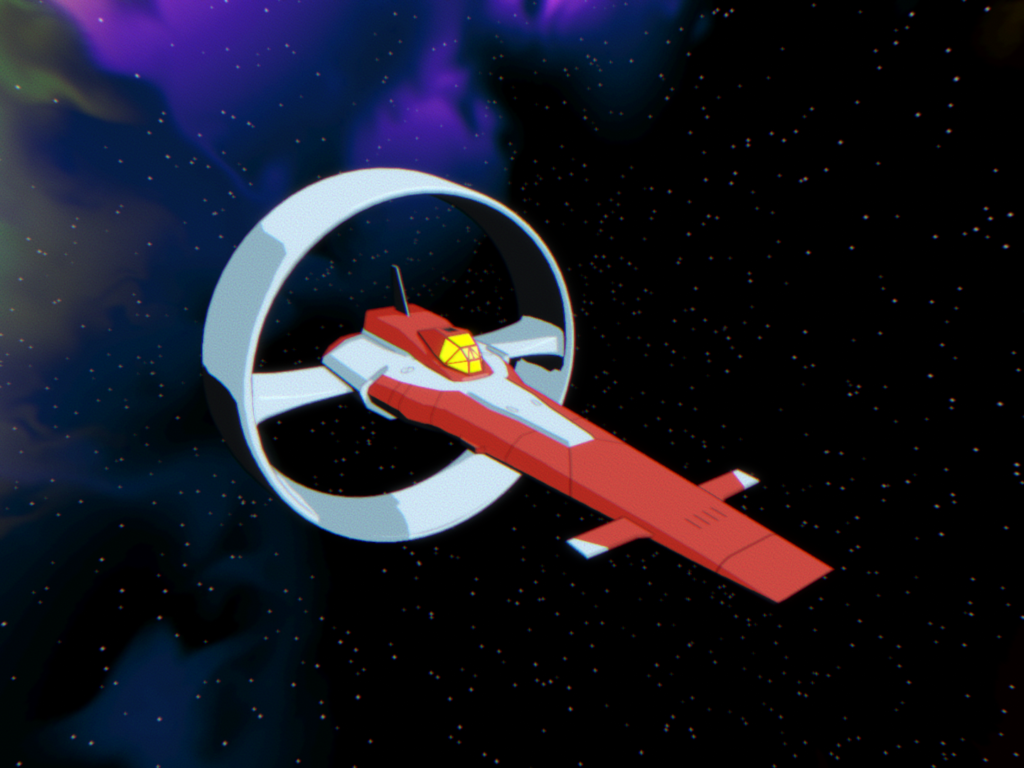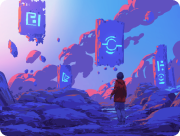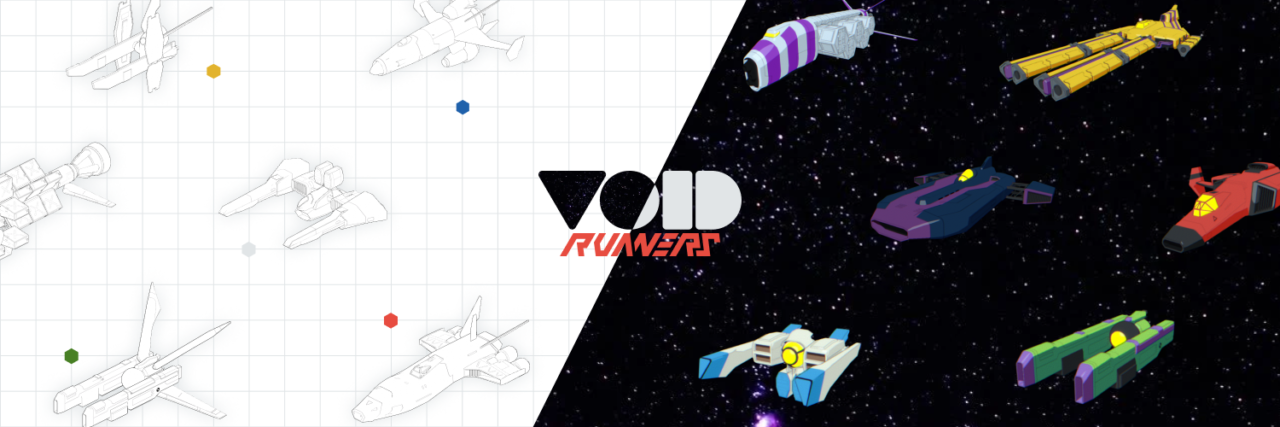In this week’s Community Spotlight, we catch up with spacedog one of the makers of the game Void Runners, a blockchain game of decision-making and strategy that is set in space.
This post is the first in a series of two and in this first part of our discussion, we spoke about how spacedog got involved in the web3 game space and what inspired her team to make this multiplayer spacefaring game, using the blockchain to enable new ways for people to interact with each other.
[Alex – Machinations] Hi Spacedog, can you tell us a little about you yourself?
[spacedog] I’m spacedog. I’m a game designer – I’ve been a game designer for a long time now. I’m building Void Runners, a blockchain-based game. I’ve got a lot of hats on this project, so as well as game design I do a lot of balancing work and economy planning, and manage the communication aspect of the game.
I work with two other core team members on the project. One who’s more on the Unity side, making ship assets, plus the game logic and tech side. And another teammate who works on the web3 solidity side, putting together our smart contracts. And between all of us, we are getting the project all done!
[A] Is Void Runners your first web3 game?
[S] Yes, Void Runners is our first web3 project. I’ve been making independent games for a long time – I worked on free-to-play games for a while and have worked on a lot of early social games and browser-based Flash projects. And web3 games sort of feel like a kind of really interesting hybrid of a lot of those skills. It has a lot of the kind of economic modeling and player balancing that I was doing in the mobile world, but then also a bunch of the experimental social dynamics that were part of the early web2 game world – it feels a lot like that “Everything’s possible” design environment that you had in the early web 2.0 phase. And so it just started to feel like a really interesting opportunity to explore the web3 space.
I was also lucky to have a chance to help out a little bit on the Legend Maps project, which helped me build my literacy about what was possible in the web3 space. And very quickly we realized that we had an idea for a game that was going to give us an excuse to make a lot of spaceships.
[A] Can you tell us a bit more about Void Runners? What was your inspiration for the game’s core mechanics?
[S] Void Runners is a social blockchain game about pushing your luck and holding your nerve. It’s set in the Void, which is a vast galaxy where trade depends on a network of Runners and Outposts, moving cargo around the galaxy. But that trade is controlled by a mysterious bureaucracy called the Galactic Trade Authority. And they like making rules and they like changing the rules – rules are about where ships can go and where they can dock.
But ships don’t have to obey the rules – ships can choose to take a risk and be illegal, but if they dock somewhere they’re not supposed to dock, the player who owns that Outpost can ticket them and confiscate all of their cargo. So there’s a big risk element there for ship owners.
What we felt was interesting about the blockchain space is that the blockchain is about enabling new kinds of human interaction. All of these problems that the blockchain is designed to solve, like trustlessness and transparency, are about letting two people come together and do a transaction in a way that they can both see and believe in it.
So if you’re going to make a web3 game, the game should be about people coming together and negotiating something. And although there are winners and losers we really wanted to have that moment of connection, that moment of personal tension.
I think what’s a little different about Void Runners from other games in this space is that a lot of other projects are designing around these interesting automatic risk protocols, where you have an NFT that you can stake and gain some kind of resource. There’s a possibility that you will lose that resource but that mechanic tends to be pretty automated – there’s a percentage chance that you’ll lose it, and it will get automatically distributed against other players. Those are still really interesting dynamics, but they don’t have that personal touch.
What got us really excited about Void Runners was this feeling of every time I dock, I’m docking in somebody’s Outpost, and if you are an Outpost owner you can see if I’m illegal. You could take my cargo right now, but if you wait five minutes, there’ll be more of it. But I might be gone in five minutes. The two of us are locked in this little duel in a way that we think is really interesting.
And that’s the core tension that sits at the heart of our game, but then there are all kinds of things that you can start to build on top of that in terms of interesting upgrades and other social dynamics. And that gave us something that we felt had a lot of room to grow.

Every runner needs a ship
[A] Were you already a fan of the space genre before starting working on Void Runners?
[S] I don’t think I would have necessarily described myself as being a sci-fi fan before working on this project. But then when we started working on Void Runners, we were looking at our bookshelves and thinking about the movies, the animes, and the games that we loved, and It was like, oh no, wait, turns out we are space fans, we just never really thought about it before.
And yes definitely the games that I played, the shows that I was watching, and the books that I was reading as a kid, have been a huge influence on the game.
[A] What would be the biggest challenges you’re facing with building Void Runners?
One of the challenges is just keeping up with the web3 space while being in the space. I could spend 16 hours a day just reading Twitter and Discord and talking to people and checking out other projects. And because the space is moving so fast, there’s a lot of real value in that. That’s not just a distraction, that’s real research – but if that’s all you do, you don’t get anything built.
When I joined the web3 community, one of the things I heard immediately is how friendly It is. And you kind of wonder a little bit if that’s just kind of wishful thinking, but it’s been incredible. I’ve been blown away by how supportive and encouraging people are. And it’s great when we have a chance to do some of that in return. That definitely feels very different from my old game design life.
[A] How is the development process different from the “traditional” gaming space?
When we came into the Web3 space, we didn’t know what working in it was going to be like – we thought, if we can come up with a cool idea, we’ll experiment a little, see what we learn, and then make a decision about whether or not we want to be doing this full time. But then we had such a positive experience. We’re loving the fact that what we’re doing is connecting immediately to an audience. You are getting immediate feedback on whether or not your idea is good.
I’ve spent a lot of time in commercial structures where you’re working for months and months on ideas that are maybe never going to see the light of day. It’s heartbreaking when you make a bunch of stuff and nobody ever sees it. Being able to work in this space where you’re connected with your audience and being able to explore a whole different dynamic that we couldn’t make anywhere else is great.
You know, we’re used to working for PC dev or console dev. The game that we’re making here, we could functionally make it on those platforms, but it wouldn’t produce the same interesting dynamics or make business sense there – this is a game that needs web3 to work.
It’s like this whole new design space opened up for things that we couldn’t do anywhere else. The aesthetic is different and there are all kinds of ideas that you can put in this space that wouldn’t necessarily be the right vibe elsewhere. We’re having way more fun than we were having working before – it just felt really freeing and exciting.
And I think as more and more people have that kind of experience, the popular impression about Web3 gaming dev is just going to change.
[A] On that matter, Web3 gaming is still a very polarizing topic. Why do you think it is? And what could the community do to change this?
[S] The way I understand it is actually connected to the experience that I was just talking about. I’ve had the luxury of getting to invest time and make personal connections and find projects that appeal to me and that suit me as a player. I’ve been able to do that because I’m working in this space.
If you don’t have that luxury it can be hard to get your head around what’s going on. There’s a lot of misinformation, but there are also some real negatives that aren’t misinformation. Those are things that you need time to think about and understand.
My experience has been that when I was first having conversations with people in the game industry last year, they were with people who had only seen the headlines, or seen a PFP project that they didn’t like, and yes, their general impression was that this space is overheated, unreliable, and not fun. If you’re somebody who comes from the deep game world where you’re looking for interactions and complicated dynamics, there just didn’t seem to be anything there for you at that time, but I’m finding that changes pretty fast.
When I’m having conversations now, a lot more people have more personal experience, they’re developing their own understanding. They’re getting more discerning about what they are interested in.
So when you’re asking, what can the web3 community do, my answer is to wait… and build!
A year from now, we’ll be in a different place for so many reasons. You know, Coinbase launched yesterday, and obviously, we’re all waiting for the Ethereum changes, but they are going to make a difference. Even while we wait for that, all of the L2 changes that are happening are changing the complexion of what’s possible.
And I personally think that the projects that are establishing themselves are really meaningful. For instance,if you look at what Forgotten Runes is doing – they were talking this week about all the activities that they have coming up, They have a big MMO game, they have a rich narrative, and they have this incredible community. I don’t think that you can look at that project and be cynical. This is a joyful creative collaboration between innovators and their community, and that’s absolutely what we’re aiming for with Void Runners.
Stay tuned for the second part of our community spotlight with spacedog! Next week she will share with us her journey with Machinations and how the team is using the tool to balance the game economy of Void Runners.
Are you using Machinations and working on something cool? Reach out to contact[at]machinations.io if you’d like to be featured in our next Community Spotlight!

